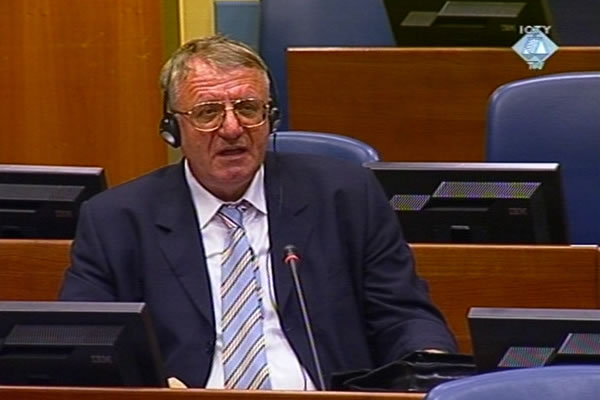Home
WHO WERE THE MEMBERS OF THE JOINT CRIMINAL ENTERPRISE
At the trial of Vojislav Seselj, prosecution tenders into evidence tapes and transcripts of intercepted telephone conversations from 1991 and 1992. According to the prosecution, the material shows the existence and functioning of the joint criminal enterprise that included the leader of the Serbian Radicals
 Vojislav Seselj in the courtroom
Vojislav Seselj in the courtroom After a whole week in closed session, parts of the trial of Vojislav Seselj proceeded in open session today to allow the public to hear audio recordings of the intercepted telephone conversations which, according to the prosecution, show that the joint criminal enterprise described in the indictment existed to show the role the accused Serbian Radical leader played in it. The hearing went into closed session every time the prosecution or the judges addressed the protected witness VS 1112 who has been testifying for four days.
The first recording was that of a conversation on 12 October 1991 between Radovan Karadzic and his poet friend, Gojko Djogo. Karadzic says Muslims would ‘disappear from the face of Earth’ if war broke out. In his words, Sarajevo would be ‘the blackest prison’ where ‘300,000 Muslims would die’, because they ‘stand no chance’ against the 300,000 armed Serbs supported by the army and wanting to ‘fight to their last breath’. Karadzic and Djogo criticize Milosevic for ‘relying on Seselj and his option’; this option is ‘nice’ but ‘neither abundant nor serious’.
The other recording played today in court shows the way the joint criminal enterprise functioned, the prosecution contends. On 8 July 1991, Milosevic made a phone call to Karadzic advising him to get in touch with General Uzelac, the commander of the Banja Luka Corps of the JNA. General Uzelac was to provide arms and helicopter transport for all Serbian Democratic Party volunteers supposed to reinforce the ‘Banja Luka group’ in the Bosnian Krajina and in Kupres. This was ‘of strategic importance for the future RAM’. Milosevic then went on to praise ‘the lunatic Seselj’ for having violently and vulgarly attacked Serbian opposition for their criticism of the JNA.
Vojislav Seselj opposed the admission of the transcripts of the intercepted telephone conversations into evidence. In his view, this was an act of ‘unconstitutional eaves-dropping’ without a court order, carried out by an ‘illegal and conspiratorial organization”. Seselj doubts the authenticity of the recordings, saying that there was an ‘uneven tone’. Above all, Seselj believes this is irrelevant for his case. In his opinion, the conversation between Radovan Karadzic and Djogo could show only that there was some kind of a joint enterprise between Karadzic’s Serbian Democratic Party and Micunovic’s Democratic Party in Serbia since Djogo was one of its founders. The Serbian Radical Party, Seselj went on to say, was ‘in bitter conflict’ with the Democratic Party, first when it was led by Micunovic, and later when it was led by Djindjic. Seselj’s party could therefore not be part of any enterprise together with them. Seselj saw Milosevic’s ‘praise’ of the attack launched by ‘the lunatic Seselj’ against the opposition as proof of Milosevic’s ‘overall animosity’ towards him because Seselj was an anti-communist, ‘ready to die in the fight against communism’. This all pointed to the conclusion, Seselj finished, that it was not possible for the two of them to take part in the same criminal enterprise.
